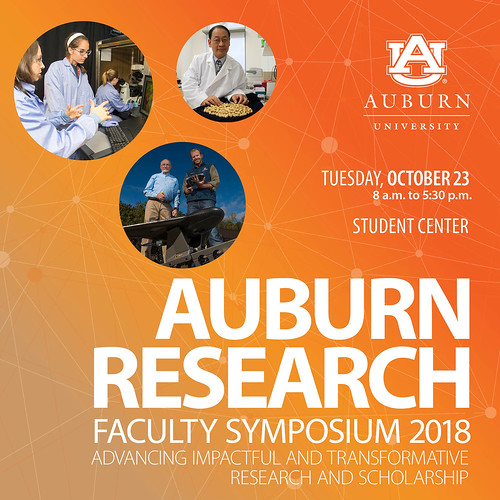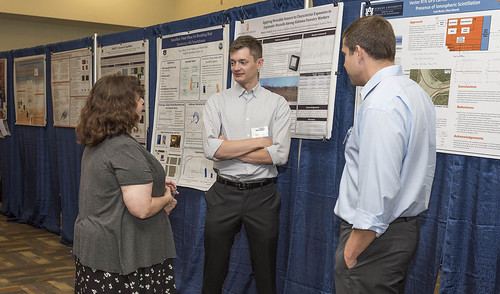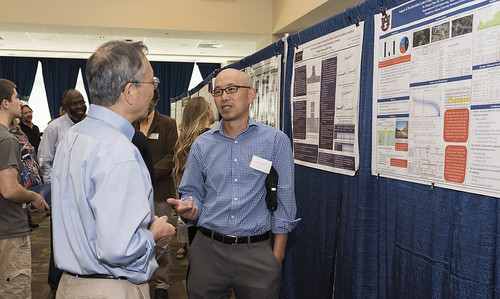Auburn research symposium highlights innovative research, from cyber security to animal-assisted intervention for improved health
Article body
Nearly 100 Auburn University faculty are gathering Oct. 23 for the 2018 Auburn Research Faculty Symposium in which they will discuss and display posters of their innovative research.
With projects ranging from cyber security to oyster farming to animal-assisted intervention for improved health, the annual event in the Student Center provides Auburn faculty an opportunity to share their discoveries university-wide and with the community.
“Auburn scientists and engineers are solving some of society’s most difficult challenges, and their efforts are improving our health, safety and economy,” said Auburn President Steven Leath. “We serve as a go-to partner for practical solutions that deliver a meaningful and often transformational impact.”
Two rounds of Auburn Talks are scheduled 8:30-10:30 a.m. in room 2222/2223 and 2:30-4:30 p.m. in the third-floor ballroom as 12 researchers, six per session, present 10-minute talks about their work.
“The Auburn Talks are like the famous TED Talks as they provide insight into great projects,” said Steve Taylor, chair of the Auburn Research Faculty Symposium Committee and associate dean for research in the Samuel Ginn College of Engineering.
The 8:30 a.m. session includes Bill Walton, College of Agriculture; Linda and O.C. Ferrell, Harbert College of Business; Wendy Troop-Gordon, College of Human Sciences; Angela Calderon and Jingjing Qian, Harrison School of Pharmacy; Wei Wang, College of Architecture, Design and Construction; and Frank Cilluffo, Ginn College of Engineering.
The 2:30 p.m. session includes Jeff Katz, College of Liberal Arts; Haruka Wada, College of Sciences and Mathematics; Lisa Kensler, College of Education; Morgan Yordy, School of Nursing; Latif Kalin, School of Forestry and Wildlife Sciences; and Benson Akingbemi and Jennifer Panizzi, College of Veterinary Medicine. The titles for the talks are available at https://aub.ie/researchfacultysymposium.
“The day will also feature a poster session and roundtable talks,” Taylor said.
Research posters will fill the ballroom from 11:30 a.m.-1:30 p.m., including posters by all recipients of the recent Presidential Awards for Interdisciplinary Research. Two sessions of roundtable discussions are scheduled 10:45-11:30 a.m. and 1:30-2:15 p.m. with both sessions covering specific research topics as well as information to help researchers advance their programs.
The 10:45 a.m. roundtable topics will include working together and talking to industry; virtual reality and augmented reality for advancing education and workforce development; protecting the nation’s infrastructure through interdisciplinary collaboration; space exploration opportunities; and connecting faculty expertise to regional economic development.
The 1:30 p.m. topics include working with foundations; resources for faculty entrepreneurs; health research opportunities in the Department of Defense; food defense and security; and a discussion of how art and science do mix.
“Our faculty put many hours into their research and creative scholarship,” Taylor said. “We invite everyone to join us at the symposium to recognize their excellent work.”
In connection with the symposium, a Creative Scholarship Showcase was held earlier this month at the Jule Collins Smith Museum of Fine Art. The multidisciplinary exhibition featured fine art, applied art and design, performing arts, creative writing and other work from 22 departments across eight colleges.
More information about the Auburn Research Faculty Symposium is available at https://aub.ie/researchfacultysymposium or by contacting Steve Taylor at taylost@auburn.edu.
Related Media
Media interested in this story can contact Communications Director Preston Sparks at (334) 844-9999 or preston.sparks@auburn.edu.
Auburn University is a nationally ranked land grant institution recognized for its commitment to world-class scholarship, interdisciplinary research with an elite, top-tier Carnegie R1 classification, life-changing outreach with Carnegie’s Community Engagement designation and an undergraduate education experience second to none. Auburn is home to more than 30,000 students, and its faculty and research partners collaborate to develop and deliver meaningful scholarship, science and technology-based advancements that meet pressing regional, national and global needs. Auburn’s commitment to active student engagement, professional success and public/private partnership drives a growing reputation for outreach and extension that delivers broad economic, health and societal impact.







